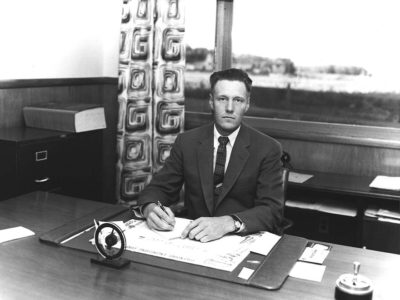Whether you’re only getting into the composting business or you’ve been doing it for many years, there is one thing that separates the companies that are successful from average producers. Do you know what it is?
People will often answer that question with one of the responses from the following list:
- Location in a green-friendly community or one with compost-friendly regulations that accepts and encourages the use of compost
- Better facility with efficient operations
- A good team that knows what they are doing and understands the customers’ needs
- Quality equipment that allows a facility to produce more products at lower costs
Your list likely goes on, but one thing that probably didn’t make your list is “just simple luck,” or maybe it is on there. Truth be told, luck, and everything else on your list of what makes a composting facility successful, can be linked back to one word — INNOVATION!
Business innovation
The word innovation gets used a lot, but if you sit down and define what change means for your company, it’s this:
Innovation is the process of discovering unmet customer needs and then developing solutions to address them.
Innovation is what it takes to continue to grow in the composting industry. It’s not luck when a producer uncovers a brand new customer base to begin selling high quality, nutrient-rich compost to. Instead it takes a savvy, innovative producer to seek out areas of opportunities and come up with the right compost mix to serve that market’s needs. After that, it takes creating and promoting that product to other potential customers with a similar set of needs.
Why you need to be innovative
A commitment to being innovative creates new business and helps established composting companies grow. It’s how Vermeer continued to expand for more than 70 years. What started as one Iowa farmer’s desire to find an easier way to unload a wagon in 1943 has grown to a worldwide organization that provides innovative equipment to a wide range of niche industries. While it was Gary Vermeer who led with innovation, it took thousands of innovators to build the organization to where it is today.
Your company doesn’t have to be Vermeer or have the same growth aspirations, but you still should set the expectation for innovation to build and maintain your business. There is a considerable need for innovators in this market. The industry needs you to continue to look for better ways to make compost and expand its usage.
From a less aspirational level, if you want to turn your operations from just focusing on incoming tip fees to focusing on the products you sell to end users, it takes hard work and being inventive. You need to seek out needs and develop the solution.
Up next
Turning your company into one known for innovation doesn’t happen overnight, it takes creating the right culture and a keen eye to discover where your next great idea will come from. Those areas will be covered in the following two parts of the Creating Innovation in Your Composting Business series.
Until then, can you think of ways your organization is currently being innovative?
Commentary provided by: Ted Dirkx
Ted Dirkx is an applications specialist for Recycling and Forestry at Vermeer Corporation. After studying composting and graduating with a degree in environmental studies from Central College, he joined equipment manufacturer Vermeer Corporation in Pella, Iowa. Traveling about 30 weeks a year, he has been roaming North America and beyond, helping organizations set up compost facilities, manufacture mulch, clear land and produce biofuels. As he interacts with operations, he is a curious learner of all things that make their operations successful. He has presented at the Compost Council of Canada Conference, Canadian Wood Waste Recycling Association, Biocycle Conference and United States Composting Council Conference on topics related to operational efficiency and maintenance.
Vermeer Corporation reserves the right to make changes in product engineering, design and specifications; add improvements; or discontinue manufacturing or distribution at any time without notice or obligation. Equipment shown is for illustrative purposes only and may display optional accessories or components specific to their global region. Please contact your local Vermeer dealer for more information on machine specifications.
Vermeer and the Vermeer logo are trademarks of Vermeer Manufacturing Company in the U.S. and/or other countries.
© 2020 Vermeer Corporation. All Rights Reserved.
